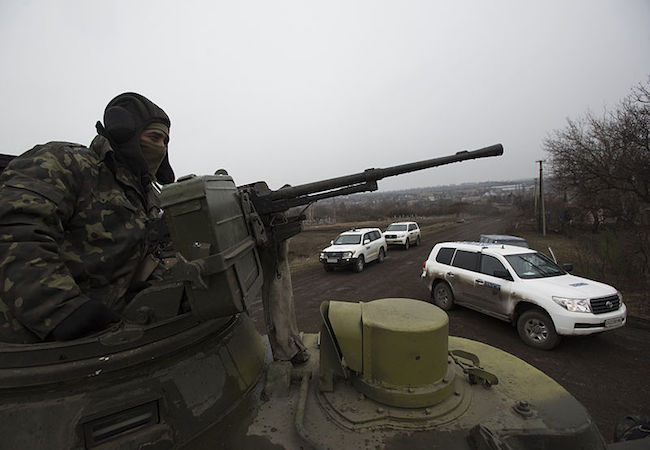Hybrid war between Russian Federation and NATO in the context of Ukraine

By Kateryna Odarchenko
When we hear the phrase hybrid war, we are trying to put into it the most capacious list of all available means aimed at achieving military goals in the modern world. And after all, it is true, ancient wars were a little simpler and often depended on the strength of the army, its numbers and equipment. But as civilization developed, war acquired many guises and technologies, many factors and aspects, the merger of which gave rise to the hybrid of war. The war is no longer so much waged by army, but to a greater extent by the special services, media, anti-government groups, terrorists, army of hackers, and even artificial intelligence is waging war through bots and modern Internet technologies.
Many people know the legend of the 300 Spartans, who held back the army of thousands of Persians, thanks to their training, invincible spirit, excellent tactics and strategy of warfare. But if you remember in this story there is also a political confrontation in the circles of the elite of Sparta, which refused to help at the right time. And also the story of a shepherd who played the role of a spy recruited by the Persians. And although this story took place many thousands of years ago, it is a kind of basis, the skeleton on which is superimposed layer by layer, each new aspect of the hybrid war, each of its facets.
As the benefits of our civilization were created, the methods and means of waging war, in fact, the methods of its destruction, were also improved. Probably, it is no secret that wars have been waged in our land from time immemorial, they have largely shaped our civilization as we know it. Wars of ancient peoples, medieval wars, world wars, wars with the use of nuclear weapons … Wars for the survival of nations, for the rule of the nation, for resources, on a racial background, on a religious background, between Jews and Arabs, between Sunnis and Shiites …
The classic definition of hybrid warfare sounds like a type of hostile action in which the attacker does not resort to a classic military invasion, but suppresses his opponent, using a combination of covert operations, sabotage, cyber warfare, and also providing support to insurgents operating on enemy territory. At the same time, hostilities may not be conducted at all, and from a formal point of view, a hybrid war can proceed in peacetime.
From the definition itself, a picture of such a war emerges not in the form of a classic military conflict or peacekeeping clash, but in the form of a spectrum of operations aimed at geopolitical superiority. Waging a hybrid war requires a significant amount of resources and skills, and not every country can conduct it to the fullest. Over the past decade, some of the world’s most significant militaries and coalitions, including the North Atlantic Treaty Organization (NATO), have tried to address and counter so-called hybrid threats.
It is not surprising that it is NATO that is puzzled by the opposition on the issue of hybrid war, since its rival bloc headed by the Russian Federation is waging such a war against them. Possessing significant resources and experience in waging wars, using in this war all the skills of its special services, as well as the above methods, the Russian Federation does it sometimes quite successfully.
However, it is probably thanks to this that the Russian Federation has earned the internationally recognized status of a terrorist country, which uses absolutely inhumane methods of waging war to achieve its narrow-minded geopolitical plans.
Describing the largest confrontation on the world geopolitical map, it is difficult not to touch upon the topic of Ukraine as a field of action for a hybrid war, which the Russian Federation is imposing on the entire civilized world.
Every day, Ukraine faces almost all the challenges that a hybrid war entails. This is a direct clash of the armed forces of Ukraine with the so-called rebels, which are also a kind of hybrid army, consisting of the army of the Russian Federation and the local recruited population. These are regular information attacks, sabotage actions, the work of the Russian special services inside Ukraine, attempts to discredit in the international arena, support for pro-Russian sentiments and associations.
By supporting and conducting military operations in Syria, the Russian Federation causes flows of refugees to the EU countries, which creates an additional economic and social burden in European society. By mining huge territories in Ukraine, the Russian Federation creates a problem for many years, both for Ukraine itself and for international organizations, which rests, among other things, on financing the demining of these territories. By shooting down planes with representatives of the European government and civilians, the Russian Federation is challenging the European values of humanism, and by neglecting international law – the values of the rule of law.
In the face of such a large-scale hybrid war, it is important for Ukraine and its Western allies to constantly develop joint tactics to counter this aggression. This should be expressed both in the coordination of the work of governments, joint military exercises, in the coordination of the work of special services and counterintelligence, as well as in close communication with humanitarianorganizations.
Kateryna Odarchenko is a foreign policy observer and writer based in Ukraine.




